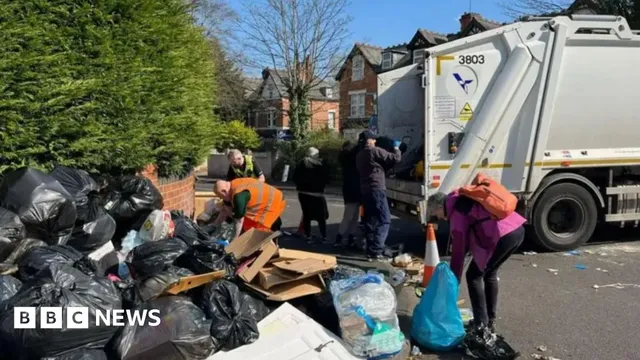
Birmingham declares major incident as garbage crisis escalates
2025-04-10 13:38- A sanitation strike in Birmingham began in early March 2025 due to disputes over pay and job security, leading to significant garbage accumulation on city streets.
- Residents reported health concerns and sightings of rats as refuse piled up, prompting the city council to declare a major incident.
- Despite ongoing negotiations between the council and the Unite union, the dispute remains unresolved, significantly impacting public health and sanitation.
Express your sentiment!
Insights
In the United Kingdom, Birmingham has been facing a significant garbage collection crisis due to an ongoing strike by members of the Unite union. The strike began in early March 2025, predominantly over disputes related to pay and job security, and has resulted in significant amounts of refuse accumulating on the streets of the city. As of April 2025, the situation has deteriorated, with streets littered with garbage, raising public health concerns. Reports indicate that residents are witnessing mountains of rubbish on the streets, and there have also been complaints about rats being attracted to the waste, leading to fears of a public health emergency. Birmingham City Council, which governs the area, has declared a major incident in response to the escalating crisis. The declaration aims to enable the council to allocate additional cleanup crews and vehicles to manage the growing waste problem. Council leader John Cotton has defended the need for changes in waste collection services, arguing that they are necessary for transforming the system, despite acknowledging that the situation has become dire. Talks between the council and the Unite union have been ongoing, but no resolution has yet been reached, leaving residents frustrated and concerned about health implications. With Birmingham being the second-largest city in the UK, this crisis not only poses a problem for its over one million residents but also raises questions about broader implications for public health and sanitation standards in urban areas. In addition, it draws attention to the role of local government in managing public services amid financial constraints, given that Birmingham City Council is facing significant budget cuts due to previous financial mismanagement. Since 2022, the council has been struggling with a budget deficit exacerbated by historical pay discrimination settlements, which has limited its capacity to respond effectively to the needs of its constituents. Reports of illegal dumping and flames from garbage sacks have further highlighted the desperation among residents. Some have resorted to depositing their refuse in neighbors' bins, while others have expressed outrage at the unsanitary conditions. The situation recalls a similar garbage strike in 2017, which lasted for seven weeks and occurred during the height of summer, underscoring the region's recurring challenges with waste management and labor disputes. Local government officials, including Health Secretary Wes Streeting, have voiced concern over the implications of increasing refuse on public health and safety in the community, calling for an urgent resolution to the strike.
Contexts
Birmingham City Council has faced significant challenges in its waste management practices that have raised concerns among residents and environmental advocates. Over the years, the council has struggled with issues such as inefficient collection schedules, inadequate recycling facilities, and a general inability to keep pace with the growing waste generated by the city's population. These issues have not only led to a decline in public satisfaction but have also raised serious environmental concerns, necessitating urgent attention and reform from local authorities. One of the main problems identified in the current waste management system is the inconsistent collection schedules that have left many residents frustrated. Delays and missed collections have become increasingly common, causing waste to accumulate and leading to unsightly neighborhoods. This has not only impacted the quality of life for citizens but has also posed health risks related to pest control and hygiene. Coupling this with reduced communication on collection times and procedures has further aggravated community dissatisfaction. Additionally, the recycling framework within Birmingham is in dire need of improvement. The city's ability to recycle waste effectively has been hampered by a lack of accessible recycling facilities and educational outreach to inform citizens about proper recycling methods. Many residents are unsure about what materials can be recycled, which can lead to contamination of recyclable goods. Consequently, this undermines the viability of recycling efforts and contributes to increased landfill usage, which is contrary to the city’s sustainability goals. In response to these challenges, it is imperative that Birmingham City Council implements a comprehensive waste management strategy that addresses these shortcomings. This strategy should include establishing more reliable collection schedules, expanding recycling facilities, and enhancing public education regarding waste disposal and recycling practices. By prioritizing these improvements, the council can regenerate community trust, improve environmental outcomes, and ensure that Birmingham is on the path toward becoming a more sustainable and cleaner city.